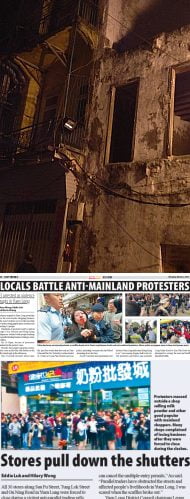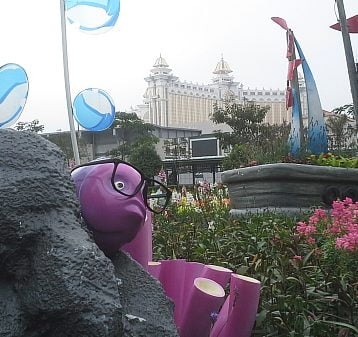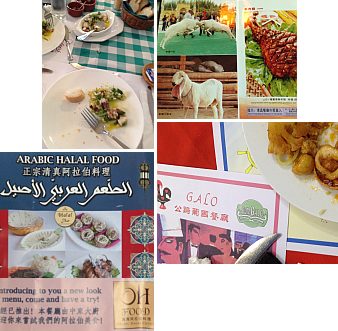To Macau, to see first-hand what a 50% year-on-year fall in casino revenues looks like up-close.
While busy, the Sheung Wan ferry terminal is not at bursting point the way it often has been on Saturday mornings in the last, say, five years or so, though there are lengthy lines of Mainland package-tour inmates waiting for cheapo stand-by seats. (Whatever happened to the groups of morose-looking Korean and Japanese golf victims who used to clog up the space near the ticket counters while waiting to go to Mission Hills?) At the Macau end, the terminal is uncrowded and the lines at immigration almost non-existent. Impressionistic conclusions: ferry operators are using their smaller vessels and/or cutting sailing frequencies, and selling off spare inventory cheap; the Macau authorities have failed to plan for falling visitor numbers and are assigning too many passport-checkers.
Time spent to board a free shuttle bus for the tacky casino closest to my destination: a bare minute. A stroll the length and breadth of the vast gambling hall at the Galaxy reveals a lot of unoccupied tables, and a gloomy abandoned section roped off at the back – possibly a tenth of the total area. As the Bloomberg report puts it, this can make the casino floor “look empty and lack energy…” Inescapable conclusion: a marked drop in the number of people in the casino. This could be simply because more casinos have been opening. And it could be something to do with Chinese New Year, which distorts tourist and other behaviour. But given the gradual decline in revenues reported over many months now, it looks like a genuine contraction in the whole Macau-tourist-gambler inundation. To bolster this impression, the ‘gaming’ industry is blaming Macau’s new (unenforced) no-smoking laws – which sounds as desperate as the Hong Kong retail-landlord-vampire complex whining about the Umbrella movement damaging sales of luxury tat.
From the Galaxy, it’s a 10-minute stroll to Taipa village. This is actually a touristy spot, but after the overwhelming glitz and fakery of the extracting-cash-from-cretins casino, it seems an untouched rural idyll. As if urban planners had acquired souls, just one street on the far edge of the settlement is devoted to the Mainland tourist/shopper. Yes, it is crowded with visitors buying the compulsory almond cakes, barbecued pork and milk powder from shops festooned with flashing lights. But the rest of the village is untouched by the scourge, and left for the local kids on bikes, Japanese with selfie-sticks, arty-crafty stores and vaguely traditional restaurants. This is not humane planning, just plain market forces producing a clustering effect – one that confines the Mainland-shopper monster to a specific and relatively small space. Conclusion: Mainland-shopper numbers are peaking or have peaked (for now, anyway).
(As a public service, some restaurant recommendations appear below.)
In downtown Macau, the main Avenue de Almeida Ribeiro drag remains chock-a-block with tired huddled masses of Mainland suitcase-draggers. How many branches of Chow Tai Fook jewellery can you cram into one street? I counted seven before giving up. (It seems they specialize: one for watches, one for necklaces, one for rings, etc.) Only a fool would bother coming here except in transit, but even so the signs are slightly  encouraging. The Largo do Senado-St Paul’s ruins area is not at the saturation point considered normal over the last few years. And, as with Taipa village, the sprawl of brand-names and locust-goodies comes to an abrupt end once you step into many of the side-streets on the periphery. Just yards from neon-splattered showcases of tiaras, you’re plunged into some unlit, grimy, slum rodent-land last subject to civil administration back in the 1920s. Macau comes in two states: gaudy, fake, plastic crap for Mainlanders, and Third-World-with-extra-dilapidation for the locals.
encouraging. The Largo do Senado-St Paul’s ruins area is not at the saturation point considered normal over the last few years. And, as with Taipa village, the sprawl of brand-names and locust-goodies comes to an abrupt end once you step into many of the side-streets on the periphery. Just yards from neon-splattered showcases of tiaras, you’re plunged into some unlit, grimy, slum rodent-land last subject to civil administration back in the 1920s. Macau comes in two states: gaudy, fake, plastic crap for Mainlanders, and Third-World-with-extra-dilapidation for the locals.
Meanwhile, back in civilization, Yuen Long becomes the latest site for anti-smuggling – or basic pro-Hongkonger – protests. The pro-landlord/developer Standard reports the conflict as one between local residents who love the shoppers and radical outsider nihilist loons. While the news report is wishful thinking, the paper’s editorial hints at facts, admitting that the Mainland-shopper influx really is reaching crisis point (ie, officials notice).
Long-term, maybe Macau and Hong Kong will still be zoned as Middle-Kingdom Monaco, where the natives are to be shoved aside for money-laundering billionaire princelings and shopping malls. Right now, however, the Chinese Communist Party has other priorities. Xi Jinping’s clampdown on corruption, designed to save the one-party state’s skin, really seems to be translating into fewer gamblers and luxury shoppers in Macau. In Hong Kong, the ‘parallel traders’ phenomenon is provoking what Communist paranoids perceive as secessionism. Fingers crossed – the wretched ‘tourism’ tide may be turning in both cities.
Briefly – Google for details – I can recommend: O Lopes (Portuguese, Taipa); Dom Galo (Portuguese, Avenida Sir Anders Ljungstedt, Macau); and Lou Lan (Islamic Halal Xinjiang etc, Rua Cinco du Outubro, Macau). Also, back in Hong Kong, Oh Food (Arab, Wanchai).



I was at the protest for about an hour and a half yesterday and the makeup was 2-300 protesters complying with police, about 1000 observers just looking and enjoying the show, and about 10 grandads and young rough looking types inappropriately upset for the atmosphere of the whole thing. It was really weird. I saw the four guys featured in the papers before the protest group got there and they were discussing where to position themselves. I just happened to be across the street when they started the abuse, broke the police cordon, and assaulted the protesters. Hell, you can see me in some of the videos online safely in the shadows of a market exit…
I suppose the SCMP’s report that “the police persuaded the Kuk not to send triads” actually meant “the police persuaded the Kuk to be a bit more subtle about it”. Still, I did raise an eyebrow at the open acknowledgement in print that the Kuk has the ability to send triads at people.
Yuen Long is seriously dodgy. Some friends of mine once found a whole fleet of BMWs without license plates on the top floor of a multistory car-park. Interestingly, there weren’t any security cameras on that floor.
How was the Lisboa ‘chicken run’ basement? That must be a surer barometer of Macau’s tourism index.
The Korean and Japanese golf victims have discovered that golf and sex are cheaper and more convenient in the Philippines.
There’s a lot more that could be sadly said about Macau, but you’re right about Taipa, you can even get a decent foot massage there. I was looking at a relatives’ pictures of Macau from 1996, you could stand in front of St Paul’s in broad daylight and be the only person there, vale dark and interesting Macau. Just a question, I can’t work out why
, despite the number of hotel rooms, room prices are above what they used to be in real terms, before the boom, when room supply was lower.
move the parallel trader-catering shop industry to Macau, voila all problems solved
Other places have same problems of being overun
http://www.nytimes.com/2015/02/26/world/south-korean-island-grows-wary-after-welcoming-the-chinese.html?WT.mc_id=D-NYT-MKTG-MOD-58070-02-28-HD&WT.mc_ev=click&WT.mc_c=
mjrelje, wasn’t the haunted (by buxom hookers doomed to circumnavigate the mall ad infinitum) Lisboa basement cleaned up a few months ago?
Maugrim, could it be higher price = luxury = more desirable? Doublethink with Chinese characteristics: do anything to save a buck, blow thousands on anything that conveys status.
No love for the Clube Militar De Macau? Last time i was in there (admittedly 2007) it was a great place for a relatively cheap din-dins accompanied by a Super-Bock or two.
Did you know that Bunny Chan featured in Tatler’s “Hong Kong’s 500 Movers and Shakers of 2014, aka the “A-List” ? I sh*t you not.
And yes, Bonnae was also on “the List”.
As a bit of a stickler for this sort of thing, I find it distinctly rum that the Swede, Anders Ljungstedt, should be granted the title “Sir”, a pre-nominal honorific that reflects exclusively the granting of a knighthood in the United Kingdom and in certain of the Commonwealth realms. Accordingly, it is grossly inappropriate, even in English, to describe as “Sir” the long-dead holder of a knighthood in the now dormant Swedish Order of Vasa.
It seems to me that the Portuguese authorities made a serious and unpardonable cock-up when, in 1997, they named one of their grotty Macanese alleys the “Avenida Sir Anders Ljungstedt”.
I wonder if Hemlock would care to have a firm word with Macao’s Director of Protocol. Failing that, might I suggest that he refer this grave faux pas to Lisbon.
@Red Dragon: how do you spell ‘English prick’ ?
Kung Hei Fat Choi to Hemmers and all the posters here (belatedly)
This post is just too good. Such a solid summary of life in casino-riddled Macau in 2015.
Hemmers – you should be branching out.
In Hong Kong, sadly no longer the place for the honest and informed, but posts like this deserve many more readers… this is easily good enough for major outlets in civilised places. Private Eye’s Letters from Our Correspondent? Foreign Affairs? You need syndication…
After pondering some more, I am not entirely convinced that the government will do anything about the parallel traders. Apart from the loss of face and the inevitable outrage from the property-retail lobby, they might find it useful to keep the likes of Civic Passion around as a sort of political boogeyman. See? This is why we can’t have nice things like democracy, the radical democrats will ruin everything. We must Stand Firm against these secessionist louts of the lowest order!
Perhaps John Tsang and CY should pay attention to what is happening in Israel:
Israelis’ resurgent interest in economic issues is in part the result of a new and damning report by the state comptroller, which criticized Netanyahu and his predecessor, Ehud Olmert, for failing to respond quicker to the country’s housing crisis. The report found that between 2008 and 2013, the price of apartments rose 55 percent and rent increased by 30 percent in real terms. The upward trend, the report found, is still ongoing. Rising housing costs, the report states, “threaten the economic stability of half a million households.” In a country of 8 million people, that is no negligible number.
http://www.slate.com/articles/news_and_politics/foreigners/2015/03/netanyahu_s_speech_to_congress_why_bibi_is_antagonizing_obama_and_the_democrats.single.html
Mainland parallel traders are by no means a HK only thing, the brave arbitragers also show up in Europe (Paris coming to mind, gotta get that LV) US (a friend saw a couple buying 50 pairs of thermal underwear in the same size at COSTCO recently) and the rest of Asia (anecdote here concerns the Mainland cabin attendant staff of a major asian airline who now have their bags searched to prevent them from smuggling cosmetics) Just supply following demand…